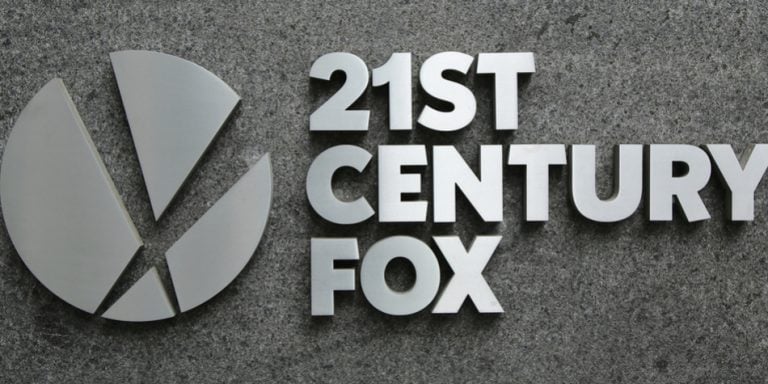On Monday, CNBC’s David Faber reported that Twenty-First Century Fox Inc (NASDAQ:FOX, NASDAQ:FOXA) was in talks with Walt Disney Co (NYSE:DIS) to sell a large number of its assets — basically everything except for Fox, Fox News and Fox Sports. It’s unclear, however, whether Fox Business would be included in a potential Disney-Fox deal.
Faber’s report noted talks have been called off … for now. Regardless, investors acted quickly: DIS stock closed up 2%; FOXA shares rose nearly 10%; FOX shares gained almost 9%. The news also spiked shares of other content creators.
For Disney, the potential acquisition would give it scale and more content for its streaming platform, set to be launched in 2019. As I wrote earlier today, those efforts highlight an intriguing, aggressive long-term strategy.
But for Fox, the sale of most of its assets is a surprising move — and one that raises questions about how its management views the content space. Those views, and Fox’s strategy going forward impact not only Fox, but myriad players on both the content and distribution sides of the media ecosystem.
Monday’s news isn’t an isolated event. Rather, it appears to be the start of a potential sea change in the content landscape. Those changes will affect companies beyond simply Disney and Fox.
Why Fox Is Selling and FOXA Stock Is Rising
Fox’s willingness to discuss selling its movie studio, TV production assets, cable channels FX and National Geographic, and international businesses Sky and Fox Star India highlight one clear belief of its management: that producing content is not a viable path forward for a smaller company.
Somewhat ironically at this point, it was FX Network head John Landgraf who coined the term “peak TV” back in 2015. In August, Landgraf admitted the peak was still in the future, pointing out that Apple Inc. (NASDAQ:AAPL) hadn’t yet entered.
Meanwhile, Netflix, Inc. (NASDAQ:NFLX), Amazon.com, Inc. (NASDAQ:AMZN), and other streaming services create new content of their own.
Landgraf worried that traditional networks simply couldn’t compete against the new tech giants — who have little, if any incentive, to be profitable in the current market. And it appears that the controlling Murdoch family shares that concern.
As large as Twenty-First Century Fox is, it’s a small player in the media world, particularly in scripted content. Its willingness to consider selling its intellectual property appears to show a concern, if not an outright fear, that it would be squeezed by larger distributors, including Comcast Corporation (NASDAQ:CMCSA), and deep-pocketed competitors.
This deal would allow Fox to essentially exit scripted content and focus on news and sports. In theory, size should matter less there, and the skyrocketing cost of creating content should be less of a concern as well. (Sports media rights fees have risen, admittedly. But Netflix repeatedly has said, most recently on its Q3 conference call, that it’s not interested in live sports and won’t be for some time.)
Fox’s admission is a bold step. And clearly, investors believe that an asset sale could bring in enough cash to drive FOX and FOXA higher – particularly with both stocks hitting 52-week lows on Friday.
What This Means for Media Stocks

As noted, other media stocks rose on the news. AMC Networks Inc (NASDAQ:AMCX) gained 5.4%. Discovery Communications Inc. (NASDAQ:DISCA) jumped 3.5%, and Viacom, Inc. (NASDAQ:VIA,VIAB) B shares gained 3.9%.
The fact that those stocks, like Fox, are at or near year-long lows no doubt helped a modest “relief rally.” For now, investors seem more intrigued by Disney’s desire for content than Fox’s willingness to sell it. But Fox’s logic would suggest those companies need to start considering a similar path.
Most interestingly, NFLX stock closed flat for the day, after initially dipping on the news. That strikes me as a bit optimistic. I continue to worry that Netflix’s dominance is eroding. Disney is pulling its content — and could pull more should it choose to acquire more — and CBS Corporation (NYSE:CBS) has launched its CBS All-Access platform.
Netflix already is becoming increasingly reliant on owned content. It’s releasing some 80 films next year, an absolutely stunning number. For now, investors remain relatively sanguine about the level of investment being made — and the cash being burned in the process.
But, as Twenty-First Century Fox appears to be arguing, content development is riskier than content distribution. And that raises a key risk for Netflix. Its algorithms can’t just measure what people want to watch.
Its development staff needs to figure that, which is a tougher process. In a world where content owners like Disney are moving toward greater and greater scale, Netflix’s own dominance seems at risk. A larger Disney would seem to be a negative for Netflix and NFLX stock.
Enjoy the Media Ride
To be sure, Monday’s speculation all comes from a deal that isn’t happening … at least, not yet. It will take years for the media industry to reshape itself.
For investors, those years will be fraught with risk and opportunity. Monday’s news may not be big on its own. But it seems like it might be the first small move in a massive, multi-year game.
As of this writing, Vince Martin is long shares of AMC Networks.
